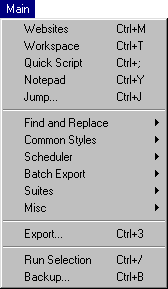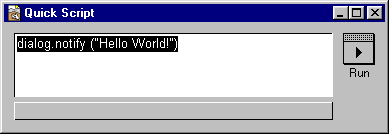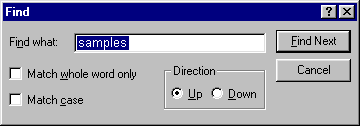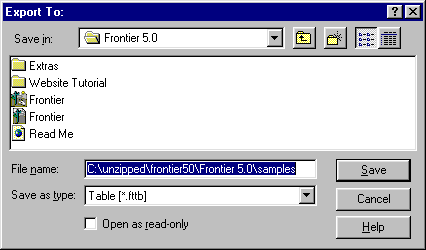Frontier 5: Main Menu
Main Menu

The Main Menu.
Websites (control-M)
This command opens the websites table, the top level of the website hierarchy in Frontier. You can create website tables elsewhere, or nested within this table.
Workspace (control-T)
Opens the workspace table. It's a great place to store personal scripts, or scripts that you want to share with other Frontier users. This is your table -- it's your workspace.
Quick Script (control-;)
Opens Frontier's Quick Script window.This window allows you to type in one-line scripts that run immediately. Type in the script, and press Enter or click on the window's Run button. Whatever value is generated by the script is displayed in the message area at the bottom of the window.
The Quick Script Window.
Notepad (control-Y)
Opens your notepad outline in a window. The outline is stored at workspace.notepad.Because this command has its own single keystroke, it's an excellent place to keep notes on your development work, items for your To-Do list, or one-line scripts that you run using the Run Selection command in the Main Menu.
Jump... (control-J)
Jump... provides a way to move directly to a specific location in the Object Database.Opens a dialog box. Enter the name of the object database location you want to look at, with confirmation, Frontier will open it for you.
The Jump Dialog Box.
If the object exists and you've supplied its correct name (including the complete path relative to any table listed in the paths table), you'll be taken directly to it. If the object is a scalar, its entry will be selected. If it's a complex object with its own editing window, that window will be opened. If Frontier can't find the object, it beeps. If there is text selected, it will be set as the object to find.
Find and Replace (control-F)
Find (control-F) opens the Find and Replace dialog window.
The Find and Replace Dialog Window.
Replace... will replace the currently selected text with the text in the Replace field of the Find dialog window.
Find Next (control-G) repeats the last find operation from the current cursor position, looking for the next occurrance of the text in the Find field of the Find dialog window.
Replace & Find Next (control-H) carries out the replacement operation called for in the Find dialog window and then repeats the last find operation from the current cursor position.
The following table summarizes the scope of the Find and Replace operation.
Find & Replace Invoked In... Has Scope Of... Main Window Entire Object Database Table Window That table and all of its sub-tables, and so on until last sub-table is searched Menubar Window That window plus all of its scripts Outline, Script or Word Processing Window That window
Common Styles
Allows you to change the font and size of an outline, script, table, or word processing selection to one of the pre-set font and size styles.You can set your own font and size display preferences at user.prefs.commonStyles.
Scheduler
Add an Hourly Task... will open a dialog box. Enter the script to be run every hour on the hour.Add an Overnight Task... will open a dialog box. Enter script to be run at midnight every night.
Open Scheduler Log opens an outline listing a record of completed tasks.
Open user.scheduler Table opens the user.scheduler table.
Batch Export
Open List opens the user.batchExporter.list outline -- the list of items to be exported.Open Table opens the user.batchExporter table, your preferences for batch exporting.
Export from List... opens a dialog box, with confirmation the items in the Batch Exporter list will be exported.
Import from Folder... opens a dialog window. Choose the folder containing objects you wish to import.
Nightly Export...opens a dialog box, with confirmation a Batch Export will be preformed every night.
Suites
Minimal Menus (control-minus) will reset the menu bar, removing any suite's menu from the Menu Bar.New Suite... opens a dialog box asking for the name of a New Suite. A new table is created in the suites table using this name. Frontier also creates the default objects need for a suite (init, menu, readme & suitename.) The new suite is added to the list of installed suites.
Installed suites is a list of suites in the suites table. Choosing a suite from this menu will launch that suite and add its specific menu to the menu bar.
Please see the Suites page for more information about Suites.
Misc
Insert Date/Time (control-4) will insert the date and time at the current cursor position.Database Search... will open a dialog box asking for the string to use in searching the entire database. (Note: it may take a while to do full search.)
Export...
Opens a dialog window with the address of the currently selected object. With confirmation, a second window opens asking for a name and the location to save the object.
The Export Dialog Window.
Run Selection (control-/)
Run Selection behaves differently depending on the type of the frontmost Frontier window. In a word processing text document, it runs the exact selection, putting the result as a message in the about window. In outline windows, this command runs the entire line (independent of the exact selection) and places the generated value as the first subhead of the line. In menubar windows, the script linked to the item is run. In table windows, the selected string or script is run if possible.
Backup... (control-B)
After confirmation, the Backup command creates a copy of Frontier.root in a sub-folder of the folder that contains the Frontier application. The sub-folder is named "backups."The backups are serialized (e.g. Frontier.361.root.361, Frontier.362.root), so as you work you leave a trail behind you.
The number of the next backup is stored at user.backups.nextBackup and the path for the backups folder at user.backups.folder.
Mac Specific Menu Items
Edit with App
AppleScripts, text windows and strings, and MacBird cards can be edited using external editors.Frontier will open the program specified at user.odbEditors.TextEditor. When you save your changes, the result is saved into the object database, not the file system.
- If you press Command-E with an AppleScript window open in Frontier, or with the table cursor pointing at an AppleScript, Frontier launches a compatible AppleScript editor and sends it a message to edit the script you've selected.
- If you choose Edit with App with a wp-text window open or highlighted in its table, Frontier will open the object in a compatible text editor. When you save your changes, they will be saved in the Object Database.
- If you choose a binary object whose sub-type is CARD, Frontier will launch the MacBird card editor to edit the card. (The MacBird card editor is the UserLand Utilities folder.)
AppleScripts
Commands for AppleScript writing and development in the Frontier environment.
Navigators
Navigator windows do the navigating for you. They are tour guides. We've programmed them to automatically take you to the hot spots in Frontier's object database, with an explanation of what's special about each spot.Main opens a window with a list of locations within the Frontier root and a "Go there" button.
Web Authoring opens a window with a list of locations within the Frontier root specific to Web Authoring and a "Go there" button.
Export Options
Packed Object is the default kind setting and used for exporting Frontier objects to Fat file format. It creates a file that is imported when it's double-clicked on.Desktop scripts run when they're double-clicked on.
For large tables with lots of sub-tables choose Folder. To import such a folder, write a desktop script that calls export.importFolder.
You can export a script in a format compatible with Apple's Script Editor. This is a standard format that's supported by all AppleScript editors, including Frontier. [You can import Script Editor files by changing the creator ID of the file to 'LAND' and double-clicking on it in the Finder.]
The normal location is File. When you click on OK, a standard file dialog appears.
You can also direct the exported object to a Eudora email message. You can choose no compression; to compress the resulting file using StuffIt 3.5 or greater; or to compress it and then BinHex the resulting file. Objects that are exported this way can be imported into Frontier by double-clicking on the file in the Finder. The objects contain information that route them to the correct object database location. Frontier will not overwrite any data without confirmation.



